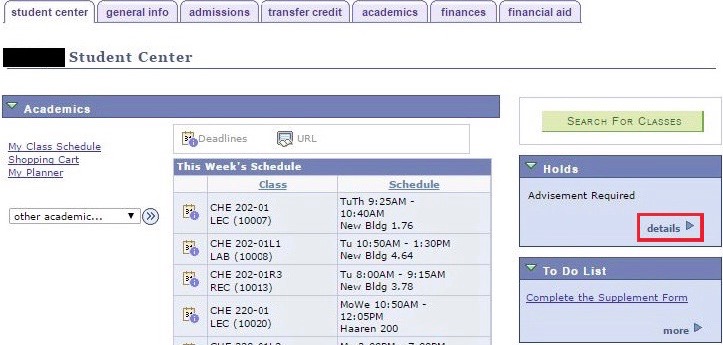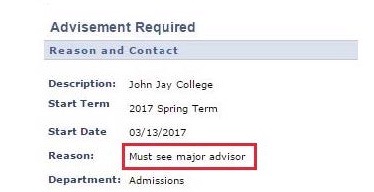Criminology Major Resources
Here you will find:
- Key information about your major
- How and when to meet with your major advisor
- Planning tools that will help you track your progress in the major
- Ways to explore career opportunities related to the Criminology major
Take a few moments to look at the information below. It will help you plan effectively and avoid surprises during your studies at John Jay. Please visit the Department of Sociology's website for information, resources, and opportunities!
Criminology Requirements
You are responsible for the major requirements that were in effect when you declared the major. To confirm the requirements you should be following, go to the Undergraduate Bulletin for that academic year. For example, if you declared the Criminology major in Fall 2015 or Spring 2016, you would click on the 2015-2016 Undergraduate Bulletin. If you declared the major and then left the College for more than one full semester, you’re responsible for the major requirements in effect when you return, if they have changed.
Below, find the Undergraduate Bulletin that was in effect when you declared the major.
- 2024-2025 Undergraduate Bulletin - Criminology
- 2023-2024 Undergraduate Bulletin - Criminology
- 2022-2023 Undergraduate Bulletin - Criminology
- 2021-2022 Undergraduate Bulletin - Criminology
- 2020-2021 Undergraduate Bulletin - Criminology
- 2019-2020 Undergraduate Bulletin - Criminology
- 2018-2019 Undergraduate Bulletin - Criminology
- 2017-2018 Undergraduate Bulletin - Criminology
- 2016-2017 Undergraduate Bulletin - Criminology
- 2015-2016 Undergraduate Bulletin - Criminology
- 2014-2015 Undergraduate Bulletin - Criminology
- 2013-2014 Undergraduate Bulletin - Criminology (PDF)
- 2012-2013 Undergraduate Bulletin - Criminology (PDF)
Major Advising
Criminology major advising is being done remotely in Fall 2025. If you have questions or want to make an appointment with a major advisor, please email socadvising@jjay.cuny.edu and an advisor will contact you.
Before You Schedule a Meeting with an Advisor
Criminology advisors are faculty in the Sociology Department. They are happy to meet with you, but there are several steps you should take before you schedule an appointment with us. These steps will allow you to make the most of an advising session:
- For all sorts of information related to the Criminology major and minor, particularly the names of the Criminology advisors for Fall 2025, check out the Sociology Department's Student Advisement website.
- Learn about the Criminology major requirements that apply to you.
During Summer and Winter sessions, students can direct all Criminology major or minor inquiries to socadvising@jjay.cuny.edu. For a lot of helpful information about the Criminology major and minor, visit the Sociology Department's Student Advisement page.
Sophomores with 45-59 credits may have a major hold placed on their registration. The hold will be removed when they have an appointment with a major advisor. This discussion will encourage wise planning and allow students to ask any questions they may have about the major. How do you know if you have a major hold? Go to CUNYfirst and complete the following steps:
- Check the Holds box of your CUNYfirst Student Center. If "Advisement Required" appears, click on “details.”

- Click on “Advisement Required.”

- See which type of advisement you need. If you must see a major advisor, then make a major advising appointment following the steps preferred by this department.

Plan Ahead: Graduate on Time
The Criminology major has several courses that build on each other in a sequence, so it is important to be aware of this and plan accordingly. Keep the following tips in mind:
- Take SOC 101 as early as possible, since it is a prerequisite for most of the courses in the major.
- You must take MAT 108 or MAT 141 before taking STA 250. Complete your math foundation early.
- Most 300 level courses require junior standing (at least 60 credits earned) and some require other prerequisites, so look ahead at what foundation courses the Criminology 300/400 level classes require.
- Be sure to take SSC 325 in your junior year.
- The Advanced Methods requirement has a prerequisite of SSC 325 and/or STA 250.
- SOC 440 Senior Seminar requires the following prerequisites: SOC 203, SOC 314, STA 250, and SSC 325. Complete these prerequisites by the end of junior year (or first semester senior year at the latest).
- Remember that you will need at least a 2.0 GPA in the major and at least a 2.0 overall GPA to graduate.
- DegreeWorks degree audit - Use this online planning tool to track your overall progress toward graduation. You will see which of your general education and major requirements are completed, in progress, or still needed. Refer to the DegreeWorks FAQs to better understand how to use this helpful tool. Note: be sure to confirm the accuracy of your degree audit with a general advisor and major advisor.
- See our Sample Four Year Plan for students who declared fall 2025 or later or our Sample Four Year Plan for students who declared prior to fall 2025 for an example of how you could complete all your degree requirements (major, general education, electives) and graduate in four years! Remember that this sample plan shows just one possible way to combine your requirements. Transfer students in particular should work with advisors to determine a plan that works best for them.
- For all sorts of information related to the Criminology major, check out the Sociology Department's Student Advisement website.
The Criminology major does not require an internship, but it is possible to pursue an internship (which provides valuable work experience) that will count as credit towards your major. Be informed and plan ahead!
The Center for Career and Professional Development houses the Academic Internship Program, a hybrid of on-the-site internship experience and class time with a faculty member. The internship course is open to juniors and seniors who have completed the prerequisite course ENG 201. In order to enroll, you must first meet with The Center for Career & Professional Development. The CCPD advisor will provide you with the course code for the internship course appropriate for you (either SOC 377-79 or SOC 381). To request an appointment with a CCPD advisor, log on to John Jay Careers Online. 15-minute drop-in sessions are available Mon-Fri 9 a.m. - 5 p.m. in 72.00 New Building. Stop by in person earlier the same day to make a drop-in appointment.
Note: CUNY Service Corps students can take the Internship course for their service. CUNY Service Corps provides a year-long experience at a particular internship site—and it pays! Keep an eye on your JJC email in February for application information concerning the following academic year.
A General Academic Advisor will confirm what general academic requirements you still need, make suggestions about smart course planning that will help you graduate without delays, discuss your interest in adding a minor or second major, inform you about opportunities such as study abroad, discuss general questions and concerns, and make helpful referrals. Visit the Academic Advisement Center's webpage for more information.
Criminology and Careers
Listen to Professor Andrew Karmen talk about what the Criminology major is, how it's focused on both research and action, the internship opportunities it offers, and how it prepares you for a range of professional careers while developing your ability to find solutions for social problems.
Criminology provides an excellent foundation for a range of careers, both within and beyond the criminal justice system. To learn which aspects of criminology and sociology most intrigue you, check out some of our helpful resources. They’ll give you information, perspective, and ideas as you consider where you most want to direct your attention.
John Jay’s Career Learning Lab is another great resource for questions related to job searches, internships, and career preparation. CLL staff are available to meet individually with students and alumni in L72.00 New Building. You can schedule an appointment or attend their walk-ins.
If you are considering graduate work in the criminology field, schedule an appointment with a Criminology advisor to discuss your interest and get their expert advice. Criminology faculty at John Jay are aware of what graduate work in the field entails, and can discuss what kinds of questions you should be asking, what kinds of programs may be best suited to your goals, and how to create the strongest academic foundation for your graduate application.